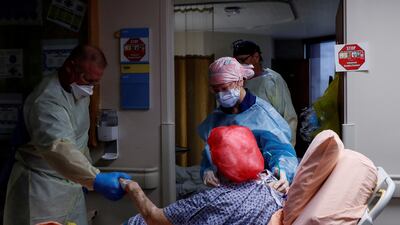Johnson & Johnson asked the US Food and Drug Administration to authorise a second dose of its Covid-19 vaccine for adults after a study showed it provided strong protection against infection.
Meanwhile, AstraZeneca also filed with the FDA to approve its Covid-19 antibody treatment.
The J&J submission includes results from a late-stage clinical trial that found a booster dose of its one-shot vaccine 56 days after the first shot provided 94 per cent protection against moderate to severe disease in the US, the company said on Tuesday.
Last week, the FDA said it had scheduled a meeting of its outside scientific advisers to discuss possible boosters of J&J and Moderna vaccines on October 14 and 15.
If authorised, J&J’s booster could give millions more Americans additional protection against the coronavirus.
About 15 million people in the US received the single-shot vaccine, the US Centres for Disease Control and Prevention said.
J&J said in September that a second dose of its vaccine provided 100 per cent protection against severe disease when given two months after the first inoculation.
The late-stage clinical trial also found that the booster was 94 per cent effective at preventing symptomatic Covid infections in the US, and 75 per cent effective overall when it was given 56 days after the initial dose.
It also brought a strong increase in protective antibodies.
Meanwhile, AstraZeneca, the drug maker that developed one of the first Covid-19 vaccines, asked the FDA to authorise the emergency use of a first-of-a-kind antibody treatment to prevent the disease.
The company said that the treatment would be the first long-acting antibody combination to receive an emergency authorisation for Covid-19 prevention.
If authorised, the drug would probably be limited to people with compromised immune systems who do not receive sufficient protection from vaccination.
“First and foremost we want to protect those vulnerable populations that haven’t been adequately protected by the vaccine,” said Menelas Pangalos, AstraZeneca’s head of research and development.
“But ultimately, it will be up to health authorities to work out who they choose to immunise.”
Mr Pangalos said the company’s long-acting formulation is designed to boost immunity for up to one year, compared with existing drugs that offer a month or two of protection.
The FDA has authorised three other antibody drugs and stressed that they are not a substitute for vaccination, which is the most effective, long-lasting form of protection.
Antibody drugs also are expensive to produce and require a drip or injection.
US demand for the treatments soared over the summer, particularly in states such as Florida, Louisiana and Texas, where unvaccinated patients threatened to overwhelm hospitals.
Late-stage human trials showed that AstraZeneca’s antibody drug reduced the risk of developing symptomatic Covid-19 by 77 per cent.
More than three quarters of the participants had suppressed immune systems that made them more susceptible to severe disease.
Mr Pangalos said the company’s drug would provide “an additional option to help protect against Covid-19 alongside vaccines".
The company will also seek regulatory authorisation in Europe and other regions around the world.

